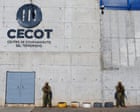
In recent days, various incidents worldwide have brought human rights issues into the spotlight, prompting calls for investigations and policy reevaluations. These developments span different regions, from the Americas and Europe to New Zealand and the Middle East, highlighting the intricate tapestry of challenges facing global societies today.
In the United States, Congresswoman Delia Ramirez has urged a congressional hearing to examine human rights violations and the utilization of federal funds for immigrant detention at a controversial El Salvador prison. This facility, known for its secretive operations, has detained nearly 300 immigrants since the onset of Donald Trump’s second presidency. Ramirez’s call reflects a growing consciousness about the treatment of individuals in detention and the accountability of governmental funding allocations.
Meanwhile, in New Zealand, electoral reforms have provoked concern over potential breaches of human rights laws. Prime Minister Christopher Luxon faces criticism from his own attorney general, Judith Collins, regarding reforms perceived to disenfranchise over 100,000 voters, including Māori populations. These reforms propose measures like closing voter enrolment ahead of elections and reinstating prisoner voting bans. Discussions surrounding these measures underscore the delicate balance between modernizing electoral laws and ensuring equal representation for all citizens.
In Europe, an incident at an Italian service station has added to the marked rise in antisemitic occurrences across the continent. A Jewish father and his young son faced a mob chanting “Free Palestine” and other derogatory phrases, culminating in physical violence against the father. This distressing event is one of several that call for a mindful reflection on tolerance and coexistence within diverse communities.
Turning to the Middle East, an aid mission to Gaza has sparked international attention following reports of American labor activist Chris Smalls being assaulted by the Israel Defense Forces. As part of the Freedom Flotilla Coalition’s effort to deliver humanitarian aid to Gaza, the interception of the vessel highlights ongoing tensions and the humanitarian challenges faced by the region. Smalls, recognized for co-founding the Amazon Labor Union, was reportedly “choked and kicked” during the incident, raising questions about the measures employed to enforce blockades and their humanitarian implications.
In another realm, back in the UK, a traumatic revelation has surfaced involving survivors of the Rotherham grooming gangs. Five women, who were victimized as children, have accused police officers of committing assaults against them. With three former officers now under investigation, this situation revives debates around institutional accountability and the protection of vulnerable individuals within justice systems.
Finally, the focus shifts to Portugal, where the organization UMAR has emphasized the importance of sexual education. By advocating for its role in combating gender-based violence and promoting equality, UMAR highlights proactive educational approaches to facilitating a more inclusive society. Their advocacy marks a positive stride towards addressing societal issues through informed education, pointing to the potential for peaceful societal transformation.
As these narratives unfold across various geographies, they collectively remind us of the shared responsibility to foster human rights and justice globally. Each story of challenge also carries seeds of hope and inspiration for future progress, underscoring the interconnectedness of global communities in the pursuit of equity and peace.
Source: {link}
